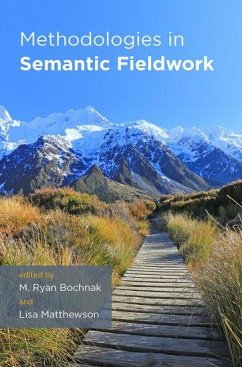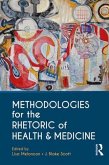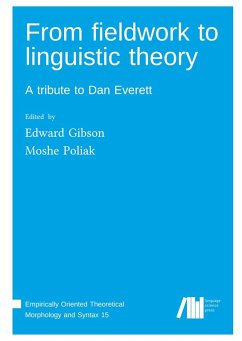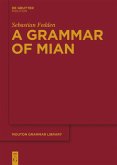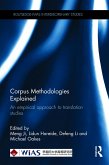M. Ryan Bochnak
Methodologies in Semantic Fieldwork
M. Ryan Bochnak
Methodologies in Semantic Fieldwork
- Gebundenes Buch
- Merkliste
- Auf die Merkliste
- Bewerten Bewerten
- Teilen
- Produkt teilen
- Produkterinnerung
- Produkterinnerung
This volume brings together papers that discuss methodological issues in conducting elicitation on semantic topics in a fieldwork situation. Each author pairs explicit methodological proposals with concrete examples of their use in the field. The range of languages discussed span 11 language families and four continents.
Andere Kunden interessierten sich auch für
![Methodologies for the Rhetoric of Health & Medicine Methodologies for the Rhetoric of Health & Medicine]() Methodologies for the Rhetoric of Health & Medicine55,99 €
Methodologies for the Rhetoric of Health & Medicine55,99 €![Methodologies for the Rhetoric of Health & Medicine Methodologies for the Rhetoric of Health & Medicine]() Methodologies for the Rhetoric of Health & Medicine177,99 €
Methodologies for the Rhetoric of Health & Medicine177,99 €![From fieldwork to linguistic theory From fieldwork to linguistic theory]() From fieldwork to linguistic theory50,00 €
From fieldwork to linguistic theory50,00 €![A Grammar of Mian A Grammar of Mian]() Sebastian FeddenA Grammar of Mian154,99 €
Sebastian FeddenA Grammar of Mian154,99 €![Doing Effective Fieldwork Doing Effective Fieldwork]() Elia Shabani MligoDoing Effective Fieldwork34,99 €
Elia Shabani MligoDoing Effective Fieldwork34,99 €![A Grammar of Vaeakau-Taumako A Grammar of Vaeakau-Taumako]() Åshild NæssA Grammar of Vaeakau-Taumako260,00 €
Åshild NæssA Grammar of Vaeakau-Taumako260,00 €![Corpus Methodologies Explained Corpus Methodologies Explained]() Corpus Methodologies Explained194,99 €
Corpus Methodologies Explained194,99 €-
-
-
This volume brings together papers that discuss methodological issues in conducting elicitation on semantic topics in a fieldwork situation. Each author pairs explicit methodological proposals with concrete examples of their use in the field. The range of languages discussed span 11 language families and four continents.
Produktdetails
- Produktdetails
- Verlag: OUP US
- Seitenzahl: 366
- Erscheinungstermin: 30. Januar 2015
- Englisch
- Abmessung: 240mm x 161mm x 26mm
- Gewicht: 780g
- ISBN-13: 9780190212339
- ISBN-10: 0190212330
- Artikelnr.: 47864000
- Herstellerkennzeichnung
- Libri GmbH
- Europaallee 1
- 36244 Bad Hersfeld
- gpsr@libri.de
- Verlag: OUP US
- Seitenzahl: 366
- Erscheinungstermin: 30. Januar 2015
- Englisch
- Abmessung: 240mm x 161mm x 26mm
- Gewicht: 780g
- ISBN-13: 9780190212339
- ISBN-10: 0190212330
- Artikelnr.: 47864000
- Herstellerkennzeichnung
- Libri GmbH
- Europaallee 1
- 36244 Bad Hersfeld
- gpsr@libri.de
M. Ryan Bochnak is a Mellon Postdoctoral Fellow and Visiting Assistant Professor in the Department of Linguistics at the University of California, Berkeley. His dissertation, "Cross-linguistic Variation in the Semantics of Comparatives," investigated the semantics of comparative constructions in Washo (isolate/Hokan) and Luganda (Bantu). Lisa Matthewson is Professor of Linguistics at the University of British Columbia. Her research interests center on semantic variation and universals, with specific attention to modality, tense, aspect, quantification, and presupposition. She has worked on St'at'imcets (Salish) since the early 1990s, on Gitksan (Tsimshianic) since 2010, and has recently begun investigating Niuean (Austronesian) and Tlingit (Na-Dene).
* Introduction
* M. Ryan Bochnak and Lisa Matthewson
* Part 1: General Overview of Elicitation Techniques
* 1. A practical epistemology for semantic elicitation in the field and
elsewhere
* Jurgen Bohnemeyer
* 2. The Problem with No-Nonsense Elicitation Plans (for semantic
fieldwork)
* Meagan Louie
* Part 2: Techniques for Particular Semantic Domains
* 3. Documenting and Classifying Aspectual Classes Across Languages
* Leora Bar-el
* 4. Investigating gradable predicates, comparison, and degree
constructions in underrepresented languages
* M. Ryan Bochnak and Elizabeth Bogal-Allbritten
* 5. Targeted construction storyboards in semantic fieldwork
* Strang Burton and Lisa Matthewson
* 6. Reasoning about equivalence in semantic fieldwork
* Amy Rose Deal
* 7. Investigating D in Languages With and Without Articles
* Carrie Gillon
* Part 3: Using Language-Internal Evidence to Guide Semantic Fieldwork
* 8. Linguistically establishing discourse context: two case studies
from Mayan languages
* Scott AnderBois and Robert Henderson
* 9. Semantic fieldwork on TAM
* Rebecca T. Cover
* 10. Deriving topic effects in Kiowa with semantics and pragmatics
* Andrew McKenzie
* 11. Reciprocity in Fieldwork and Theory
* Sarah E. Murray
* 12. Theories of meaning in the field: Temporal and aspectual
reference
* Rebecca Cover and Judith Tonhauser
* M. Ryan Bochnak and Lisa Matthewson
* Part 1: General Overview of Elicitation Techniques
* 1. A practical epistemology for semantic elicitation in the field and
elsewhere
* Jurgen Bohnemeyer
* 2. The Problem with No-Nonsense Elicitation Plans (for semantic
fieldwork)
* Meagan Louie
* Part 2: Techniques for Particular Semantic Domains
* 3. Documenting and Classifying Aspectual Classes Across Languages
* Leora Bar-el
* 4. Investigating gradable predicates, comparison, and degree
constructions in underrepresented languages
* M. Ryan Bochnak and Elizabeth Bogal-Allbritten
* 5. Targeted construction storyboards in semantic fieldwork
* Strang Burton and Lisa Matthewson
* 6. Reasoning about equivalence in semantic fieldwork
* Amy Rose Deal
* 7. Investigating D in Languages With and Without Articles
* Carrie Gillon
* Part 3: Using Language-Internal Evidence to Guide Semantic Fieldwork
* 8. Linguistically establishing discourse context: two case studies
from Mayan languages
* Scott AnderBois and Robert Henderson
* 9. Semantic fieldwork on TAM
* Rebecca T. Cover
* 10. Deriving topic effects in Kiowa with semantics and pragmatics
* Andrew McKenzie
* 11. Reciprocity in Fieldwork and Theory
* Sarah E. Murray
* 12. Theories of meaning in the field: Temporal and aspectual
reference
* Rebecca Cover and Judith Tonhauser
* Introduction
* M. Ryan Bochnak and Lisa Matthewson
* Part 1: General Overview of Elicitation Techniques
* 1. A practical epistemology for semantic elicitation in the field and
elsewhere
* Jurgen Bohnemeyer
* 2. The Problem with No-Nonsense Elicitation Plans (for semantic
fieldwork)
* Meagan Louie
* Part 2: Techniques for Particular Semantic Domains
* 3. Documenting and Classifying Aspectual Classes Across Languages
* Leora Bar-el
* 4. Investigating gradable predicates, comparison, and degree
constructions in underrepresented languages
* M. Ryan Bochnak and Elizabeth Bogal-Allbritten
* 5. Targeted construction storyboards in semantic fieldwork
* Strang Burton and Lisa Matthewson
* 6. Reasoning about equivalence in semantic fieldwork
* Amy Rose Deal
* 7. Investigating D in Languages With and Without Articles
* Carrie Gillon
* Part 3: Using Language-Internal Evidence to Guide Semantic Fieldwork
* 8. Linguistically establishing discourse context: two case studies
from Mayan languages
* Scott AnderBois and Robert Henderson
* 9. Semantic fieldwork on TAM
* Rebecca T. Cover
* 10. Deriving topic effects in Kiowa with semantics and pragmatics
* Andrew McKenzie
* 11. Reciprocity in Fieldwork and Theory
* Sarah E. Murray
* 12. Theories of meaning in the field: Temporal and aspectual
reference
* Rebecca Cover and Judith Tonhauser
* M. Ryan Bochnak and Lisa Matthewson
* Part 1: General Overview of Elicitation Techniques
* 1. A practical epistemology for semantic elicitation in the field and
elsewhere
* Jurgen Bohnemeyer
* 2. The Problem with No-Nonsense Elicitation Plans (for semantic
fieldwork)
* Meagan Louie
* Part 2: Techniques for Particular Semantic Domains
* 3. Documenting and Classifying Aspectual Classes Across Languages
* Leora Bar-el
* 4. Investigating gradable predicates, comparison, and degree
constructions in underrepresented languages
* M. Ryan Bochnak and Elizabeth Bogal-Allbritten
* 5. Targeted construction storyboards in semantic fieldwork
* Strang Burton and Lisa Matthewson
* 6. Reasoning about equivalence in semantic fieldwork
* Amy Rose Deal
* 7. Investigating D in Languages With and Without Articles
* Carrie Gillon
* Part 3: Using Language-Internal Evidence to Guide Semantic Fieldwork
* 8. Linguistically establishing discourse context: two case studies
from Mayan languages
* Scott AnderBois and Robert Henderson
* 9. Semantic fieldwork on TAM
* Rebecca T. Cover
* 10. Deriving topic effects in Kiowa with semantics and pragmatics
* Andrew McKenzie
* 11. Reciprocity in Fieldwork and Theory
* Sarah E. Murray
* 12. Theories of meaning in the field: Temporal and aspectual
reference
* Rebecca Cover and Judith Tonhauser

